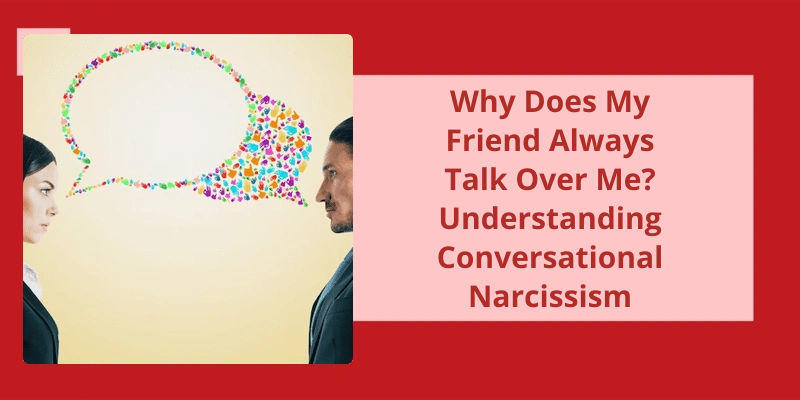Instead, try to approach the situation with empathy and understanding. It can be frustrating to feel like you're constantly being interrupted or overlooked, but it's important to consider the underlying reasons for your friend's behavior. Are they going through a tough time and seeking validation? Are they used to dominating conversations in their other social circles? By having an open and honest conversation with your friend, you may be able to uncover the root of the issue and find a solution that works for both of you. Remember that communication is key to any successful relationship, and with patience and understanding, you can work through this challenge together.
Why Does a Person Talk Over Another Person?
Additionally, some individuals may have grown up in households where interrupting was the norm or even encouraged as a sign of intelligence or assertiveness. In these cases, interrupting or talking over someone may simply be an ingrained behavior that’s difficult to break. Lack of social skills or emotional regulation can also be factors in why a person might talk over another person.
Another reason that someone might talk over others is because they feel that their ideas or opinions are more important or valuable than those of the other person. This can be a result of a lack of empathy or an inflated sense of self-importance. It can also be a defense mechanism to avoid being challenged or criticized by others. By talking over someone, the speaker can maintain control of the conversation and avoid the discomfort of having their views questioned.
It’s important to note that talking over someone can be a form of aggression or domination in some situations, particularly in professional or hierarchical settings. This may be used as a way to assert power or control over others, or to discredit their ideas or opinions. It can also be a tactic used to silence those who’re perceived as weaker or less assertive. In such cases, the act of interrupting becomes less about communication and more about exerting dominance.
In relationships, talking over someone can be a damaging habit that leads to misunderstanding, resentment, and conflict. It can breed a lack of respect and communication, leaving both parties feeling unheard and disrespected. It’s important for individuals to recognize when they’re talking over someone and make a conscious effort to listen and acknowledge the other persons perspective. Good communication skills involve actively listening and being open to new ideas and perspectives, even if they don’t align with our own.
It’s important for individuals to recognize this behavior and take steps to improve their communication skills, whether that be through therapy, self-reflection, or simply being mindful in conversation. By actively listening and being respectful of others ideas and opinions, we can foster healthier and more productive communication in our personal and professional relationships.
How to Handle Situations Where Someone Is Constantly Talking Over You
When dealing with someone who constantly talks over you, it’s important to remain calm and collected. Start by acknowledging their input, but politely ask them to allow you to finish speaking. Use active listening techniques, such as repeating their main points back to them, and try to find common ground. If all else fails, suggest taking turns speaking or bringing in a third party to mediate the conversation.
Conclusion
Instead, try calmly and respectfully addressing the issue with your friend. Let them know that you value their opinions, but also need the space to express your own ideas and thoughts. Open and honest communication is key, and finding a compromise that works for both of you can improve your friendship and reduce frustration. Remember, friendships take effort and understanding, and with patience and empathy, you can overcome any obstacles that come your way.






